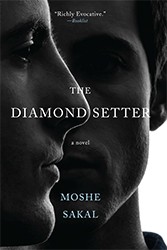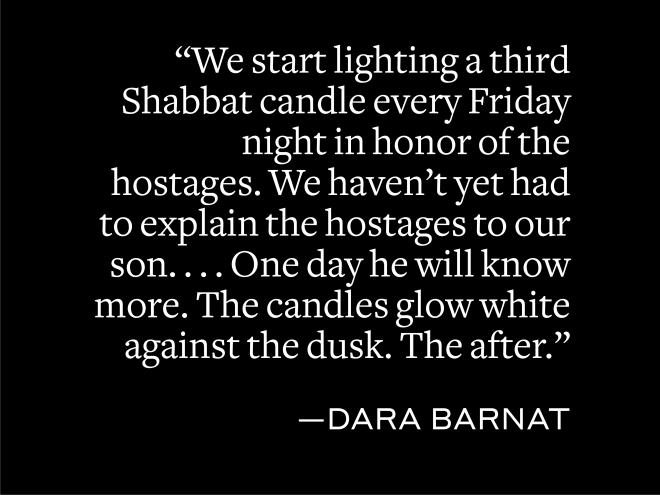
The French version of this text was published in Libération, France, October 17, 2023
This piece is one of an ongoing series that we will be sharing in the coming days from Israeli authors and authors in Israel.
It is critical to understand history not just through the books that will be written later, but also through the first-hand testimonies and real-time accounting of events as they occur. At Jewish Book Council, we understand the value of these written testimonials and of sharing these individual experiences. It’s more important now than ever to give space to these voices and narratives.
In collaboration with the Jewish Book Council, JBI is recording writers’ first-hand accounts, as shared with and published by JBC, to increase the accessibility of these accounts for individuals who are blind, have low vision or are print disabled.
The night before the Hamas attack on Israel, I had been in a state of restlessness, plagued by personal frustration and deep sadness. In a dream, I found myself sitting in a cafe on Ibn Gabirol Street in Tel Aviv, though the ambiance felt strangely foreign, more reminiscent of a European city. As I watched the diners enjoy their meals, engage in lively conversation, and savor their drinks, a disturbing thought consumed me: “They don’t know they’re going to die.” It was a mental image that caused anxiety, but I managed to calm my disquiet by reminding myself that it was only a dream.
The unsettling night continued, and when I finally reached for my cell phone, I discovered a message from my sister. It read, “How are you, dear? The kids are staying with Guy’s parents and there haven’t been any sirens in their neighborhood yet. It’s really scary…”
The next time we spoke, two days later, the weight of the morning of October 7 was palpable. Those two days had brought awareness of the devastating Hamas attack, and when I answered – it was a video call this time – I was greeted by the faces of my family: siblings, sisters and brothers-in-law, and my seven nieces and nephews. They were all scattered throughout Israel, each seeking refuge from the wailing of the air raid sirens.
As they looked up at the screen, they saw tall columns and a splendidly decorated ceiling filling the background of my video feed. The children’s eyes widened at the sight of statues and people crowding around me, chatting animatedly or snapping pictures with their cell phones.
The eldest niece, her curiosity piqued, finally asked, “Uncle Moshe, where are you?”
“I am in Paris,” I replied, almost in disbelief at the incongruity of it all.
“Paris?” another nephew with round glasses and curly hair chimed in. “But don’t you live in Berlin?”
“I do live in Berlin,” I assured him, “but I’m in Paris. To be honest, I’m not quite sure what I’m doing here now…”
My last words hung in the air, and I wasn’t sure if they had reached the children. Despite the bustling crowd around me, my focus was unwavering on my family, and I didn’t pause to consider that perhaps this was not the most appropriate place or time for our conversation.
My parents, sitting in their apartment in Tel Aviv, my childhood home, watched the little faces on the screen, no doubt wondering when they would meet us all together again in real life.
The children, however, had no interest in the wider circumstances. Their curiosity was running wild, and they fired off questions as only children do. They wanted to know exactly where I was, their brows furrowed as they tried to make sense of the surreal setting. The place before them was a whirlwind of activity, perhaps resembling a bustling commercial center on one side and a palace from their fairy tales on the other.
In the end, the allure of the paintings and sculptures won out. One of my nephews, who had briefly experimented with blonde hair during a summer vacation in Thailand only to return to his familiar brown hue by the start of the school year, asked, “Are you in a museum, Uncle Moshe?”
“I’m not in any museum,” I replied, “I’m in the Louvre.”
Before returning to our home in Berlin, my partner and I had a few hours to kill in Paris and decided to seek solace in the eternal art of the Louvre. However, the museum was far more crowded than usual, making it almost impossible to fully appreciate the world-famous masterpieces.
Now the children beamed with satisfaction at the mention of the Louvre. For a brief moment, they put aside the strangeness of the situation and accepted that their uncle was speaking to them from inside one of the world’s most famous museums, a place where visitors are expected to tiptoe and any breach of decorum is met with stern looks from the guards, who are quick to demand silence.
The gravity of the situation weighed heavily on us, but we chose not to address it directly during our video call. Instead, it permeated every unspoken exchange, lurking beneath our smiles. We didn’t delve into the horrors of child abductions, the atrocities of massacres, the burning of kibbutzim, or the rocket attacks. We didn’t talk about the hours spent in a safe room, the drone of sirens, the eerie silence that follows the fall of rockets, or the constant fear of more brutality to come, and of stockpiling food.
At one point, my young niece, a wall climber who fears nothing, suggested an unexpected diversion: “Take us to see the Mona Lisa, Uncle Moshe!”
“The Mona Lisa?” I exclaimed in surprise. “I could barely get a glimpse of it myself. The room is so crowded with visitors that it’s a challenge to get anywhere near it, and the guards are strict about maintaining order.”
But when the children set their minds on a particular goal, not even the devil can get it out of their heads. “The Mona Lisa!” they insisted, “Uncle Moshe, take us to see the Mona Lisa!”
What else could I do? Navigating the crowded Louvre, I ventured into the Mona Lisa room. Although I couldn’t get too close, I held my phone high above the crowd to give my nephews and nieces a glimpse of the iconic masterpiece. After all, as a gay uncle, it was my unspoken duty to respect their whims and obey their commands.
Once their wish was granted, a hushed silence fell over our video call. We said goodbye with virtual kisses, and gradually my family’s faces disappeared from my screen. I left the busy gallery, away from the throngs of tourists, and ventured to see “The Raft of the Medusa” by French Romantic painter Théodore Géricault, a larger-than-life painting depicting the aftermath of the shipwreck of the French frigate Méduse off the coast of Mauritania in July 1816. At least 147 people were set adrift on a makeshift raft, where only 15 survived after enduring starvation, dehydration, and cannibalism due to the captain’s widely accused incompetence.
As night fell, I tried to sleep, thinking about the video call with my family. My mind wandered to a distant memory: the birth of my eldest niece in Tel Aviv, some fifteen years ago.
“My sister’s last cry echoes through the hospital walls at 4:50 in the morning,” I had written in my journal that day. “After that cry, new cries pierce the air, the cries of a newborn baby, a little girl, my first niece. I listened to my sister’s cries for half an hour, her voice now overshadowed by the new life she had brought into the world. I entered my sister’s room to find the first light of dawn filtering through the window, casting a soft glow on the baby’s delicate purple skin. She lay in my sister’s arms, wrapped in the soft hospital blanket, her tiny legs peeking out. Her mouth had already begun to suckle for nourishment.
I put my hand on my sister’s shoulder, as we did when we were children, when we reconciled, after the banging of heads against the wall, the deep cuts in the flesh, when I took my tongue out of my mouth and licked the red blood from my skin, and then waved a white flag of surrender, of a cease-fire. It’s all over now.”
The views and opinions expressed above are those of the author, based on their observations and experiences.
Support the work of Jewish Book Council and become a member today.
Moshe Sakal lives in Berlin, Germany. He is a novelist acclaimed by NBC, Le Monde and Haaretz, and has published six novels in Hebrew. His novel The Diamond Setter (Other Press, NYC 2018) has been translated into English by Jessica Cohen, winner of the Man Booker Prize. His novel Yolanda (Stock, 2012) has been translated into French by Valérie Zenatti. Anne Birkenhauer has translated excerpts from his forthcoming novel into German.
Sakal’s various publications include the German literary magazine Sinn und Form and the German newspaper Frankfurter Allgemeine Zeitung (FAZ).
Sakal’s writing delves into diverse themes such as exile, immigration, diaspora, border crossing, queer life and intergenerational relationships. His work has earned him two nominations for the prestigious Sapir Prize and the Eshkol Prize for his artistic contributions. Sakal was also awarded a Fulbright Scholarship to participate in the International Writing Program at the University of Iowa, where he was named an Honorary Fellow in Writing.
In 2021, Sakal was awarded the Literature grant of the Berlin Senate Department for Culture and Europe in support of his forthcoming novel.



